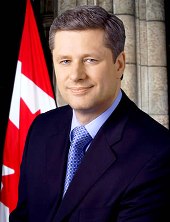|
| Help | |
| You are here: Rediff Home » India » Business » Report |
| Advertisement | |||||||||||||||||||||||
| |||||||||||||||||||||||
| |||||||||||||||||||||||
| Advertisement | |||||||||||||||||||||||
G-20 officals' meet takes off in Canada
 Canadian Prime Minister Stephen Harper welcomed officials from G-20 countries for their two-day meeting or what Globe and Mail, in its March 18 report described 'secretive discussions'.
Canadian Prime Minister Stephen Harper welcomed officials from G-20 countries for their two-day meeting or what Globe and Mail, in its March 18 report described 'secretive discussions'.
"The relatively brief leaders' summits are the culmination of months of work at various levels of our governments to arrive at the final declarations," Harper told the officials.
The G-20 leaders will meet on June 25-26 at the Metro Toronto Convention Center, their theme this year being Recovery and New Beginnings.
Harper suggested to officials, including India's finance secretary Ashok Chawla and J S Mukul of the ministry of external affairs, that they should begin delivering on the actions agreed to at earlier G-20 meetings in Washington, London and Pittsburgh.'
His suggestion, therefore, was that the countries 'must continue with our stimulus measures' and based on the framework launched in Pittsburgh, discussions at the coming G-20 meeting must focus on achieving 'long-term growth that is balanced and sustainable' which will 'enable us to identify specific actions at our next leaders' summit in Seoul in November.'
Financial experts all over the world know deregulation of financial institutions in the US and other countries led to the financial crisis of 2008. The realty market collapsed, thanks to sub-prime mortgages.
That, however, did not happen in Canada as in that country, financial institutions function under highly disciplined regulations. In fact, Canada's finance minister recently ordained that banks would have to secure 25 per cent down payment before approving mortgages.
"We must strengthen regulatory systems for the financial sector," Harper suggested. This, to him, was 'a matter of urgency.'
Also, he suggested, it is important for the G-20 'to promote a sense of shared responsibility for the global economy, for the happiness and well-being of people around the world.'
Calling the G-20 officials sherpas of their respective countries, Harper told them that they should 'be keenly aware of the central role you play in this regard' and that being 'the policies you are working on -- effective and sustainable monetary and fiscal measures, sound and well-regulated financial institutions, open and competitive trade flows.'
These, he said, 'are not ends in themselves (but) they are the basis of a system that has provided opportunity and hope.'
The G-20 Summit in Toronto will once again play a historic role 'in dealing with the most severe financial and economic crisis facing the world since the Great Depression,' noted Harper.
So, the collective efforts of G-20 leaders 'are helping to minimise the impact of the crisis and to favour a more rapid recovery. In so doing, the G-20 is playing the rightful role as a principal forum for international economic cooperation.'
Two days before the G-20 conference, Canada will host the G-8 Summit of leaders of industrialised countries.
Issues that will come up for discussion before the G-8 leaders include terrorism, global security, Afghanistan, etc. But it is widely accepted now that G-8 is gradually losing its significance.
G-20, on the other hand,is now 'the world's principal economic forum,' Harper conceded.
A front-page report in the Globe and Mail carried some excerpts from a 4-page discussion paper that the Canadian government has prepared for the G-20 officials' conference.
The paper reportedly says there should be no 'premature withdrawal of stimulus spending' as 'it could jeopardise the current recovery'.
The paper also reportedly speaks about 'promoting strong, sustainable and balanced growth, strengthening financial and regulatory systems, resisting protectionism and promoting trade and investment and reforming international financial institutions.'
Indian high commissioner S M Gavai, however, could not provide any information about India's point of view on the G-20.
"It is a multilateral conference and that's handled directly by officials from New Delhi," he said in a telephone interview.
Image: Stephen Harper
| © 2009 Rediff.com India Limited. All Rights Reserved. Disclaimer | Feedback |
